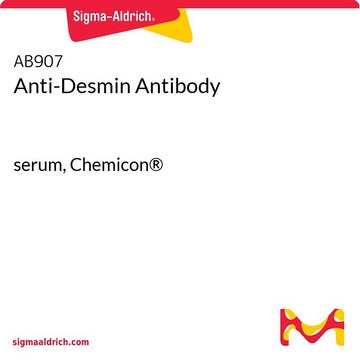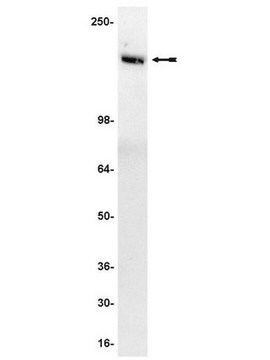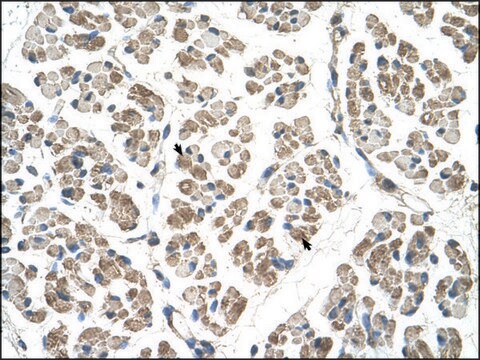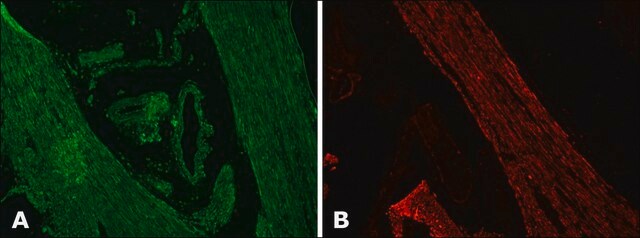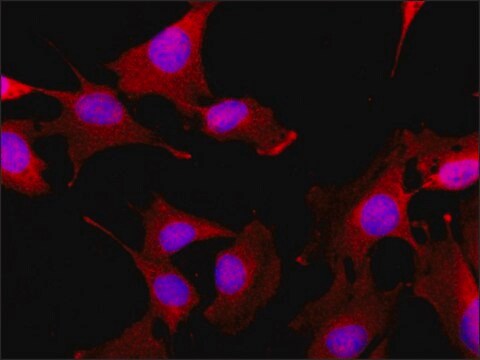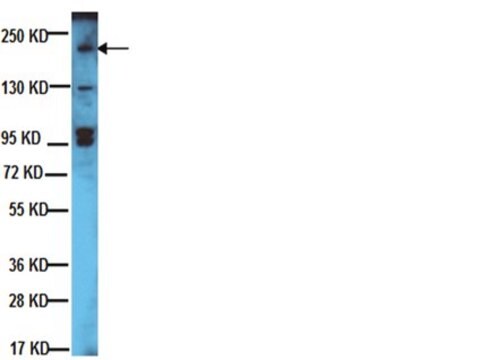おすすめの製品
由来生物
mouse
品質水準
抗体製品の状態
purified antibody
クローン
DE-B-5, monoclonal
交差性
mouse, frog, pig, rat, human
メーカー/製品名
Chemicon®
テクニック
immunohistochemistry (formalin-fixed, paraffin-embedded sections): suitable
western blot: suitable
アイソタイプ
IgG1
NCBIアクセッション番号
UniProtアクセッション番号
輸送温度
wet ice
ターゲットの翻訳後修飾
unmodified
遺伝子情報
human ... DES(1674)
特異性
The antibody reacts with desmin from human, pig, rat and taod. In tissue sections this antibody is used to stain skeletal, cardiac, visceral, and some vascular smooth muscle cells. Cell lines such as RD (ATCC CCL 136) and hamster BHK-21 are positive (Debus et al., 1983).
免疫原
Purified desmin.
アプリケーション
Research Sub Category
細胞骨格
細胞骨格
Detect Desmin using this Anti-Desmin Antibody, clone DE-B-5 validated for use in WB, IH, IH(P), IH(P).
Immunocytochemistry: (5 μg/ml) Immunohistochemistry: (5 μg/ml) See IHC2011-6 for prediluted and detailed paraffin protocols.
Optimal working dilutions must be determined by end user.
Immunohysto/cyto chemistry Protocols
Ideal specimens are obtained from frozen sections from shock-frozen tissue samples. The frozen sections are dried in the air and then fixed with acetone at -20°C for 10 min. Excess acetone is allowed to evaporate at 15-25°C. Material fixed in alcohol and embedded in paraffin can also be used (2). Formaldehyde fixation will reduce or eliminate the intensity of staining depending on the conditions under which it is performed. Other fixation conditions must be first tested by the investigator.
It is advantageous to block unspecific binding sites by overlaying the sections with fetal calf serum for 20-30 min at 15-25°C. Excess of fetal calf serum is removed by decanting before application of the antibody solution.
Cytocentrifuge preparations of single cells or cell smears are also fixed in acetone. These preparations should, however not be dried in the air. Instead, the excess acetone is removed by briefly washing in phosphate-buffered saline (PBS).
Further treatment is then as follows:
• Overlay the preparation with 10-20 μl antibody solution and incubate in a humid chamber at 37°C for 1 h.
• Dip the slide briefly in PBS and then wash 3 x in PBS for 3 min (using a fresh PBS bath in each case).
• Wipe the margins of the preparation dry and overlay the preparation with 10-20 μl of a solution of anti-mouse Ig-FITC or anti-mouse IgG-peroxidase solution and allow to incubate for 1 h at 37°C in a humid chamber.
• Wash the slide as described above.
The preparation must not be allowed to dry out during any of the steps.
If using an indirect immunofluorescence technique, the preparation should be overlaid with a suitable embedding medium (e.g. Moviol, Hoechst) and examined under the fluorescence microscope. If a POD-conjugate has been used as the secondary antibody, the preparation should be overlaid with a substrate solution (see below) and incubated at 15-25°C until a clearly visible redbrown color develops. A negative control (e.g. only the secondary antibody) should remain unchanged in color during this incubation period. Subsequently, the substrate is washed off with PBS and the preparation is stained, if desired, with hemalum stain for about 1 min. The hemalum solution is washed off with PBS; the preparation is embedded and examined.
Substrate solutions:
Aminoethyl-carbazole: Dissolve 2 mg 3-amino-9-ethylcarbazole with 1.2 ml dimethylsulfoxide and add 28.8 ml 50 mM Tris-HCI, pH 7.3, and 20 μl 3% H 2 O 2 (w/v). Prepare solution freshly each day. Diaminobenzidine: Dissolve 25 mg 3,3′-diaminobenzidine with 50 ml 50 mM Tris-HCI, pH 7.3, and add 40 μl 3% H 2 O 2 (w/v). Prepare solution freshly each day.
Optimal working dilutions must be determined by end user.
Immunohysto/cyto chemistry Protocols
Ideal specimens are obtained from frozen sections from shock-frozen tissue samples. The frozen sections are dried in the air and then fixed with acetone at -20°C for 10 min. Excess acetone is allowed to evaporate at 15-25°C. Material fixed in alcohol and embedded in paraffin can also be used (2). Formaldehyde fixation will reduce or eliminate the intensity of staining depending on the conditions under which it is performed. Other fixation conditions must be first tested by the investigator.
It is advantageous to block unspecific binding sites by overlaying the sections with fetal calf serum for 20-30 min at 15-25°C. Excess of fetal calf serum is removed by decanting before application of the antibody solution.
Cytocentrifuge preparations of single cells or cell smears are also fixed in acetone. These preparations should, however not be dried in the air. Instead, the excess acetone is removed by briefly washing in phosphate-buffered saline (PBS).
Further treatment is then as follows:
• Overlay the preparation with 10-20 μl antibody solution and incubate in a humid chamber at 37°C for 1 h.
• Dip the slide briefly in PBS and then wash 3 x in PBS for 3 min (using a fresh PBS bath in each case).
• Wipe the margins of the preparation dry and overlay the preparation with 10-20 μl of a solution of anti-mouse Ig-FITC or anti-mouse IgG-peroxidase solution and allow to incubate for 1 h at 37°C in a humid chamber.
• Wash the slide as described above.
The preparation must not be allowed to dry out during any of the steps.
If using an indirect immunofluorescence technique, the preparation should be overlaid with a suitable embedding medium (e.g. Moviol, Hoechst) and examined under the fluorescence microscope. If a POD-conjugate has been used as the secondary antibody, the preparation should be overlaid with a substrate solution (see below) and incubated at 15-25°C until a clearly visible redbrown color develops. A negative control (e.g. only the secondary antibody) should remain unchanged in color during this incubation period. Subsequently, the substrate is washed off with PBS and the preparation is stained, if desired, with hemalum stain for about 1 min. The hemalum solution is washed off with PBS; the preparation is embedded and examined.
Substrate solutions:
Aminoethyl-carbazole: Dissolve 2 mg 3-amino-9-ethylcarbazole with 1.2 ml dimethylsulfoxide and add 28.8 ml 50 mM Tris-HCI, pH 7.3, and 20 μl 3% H 2 O 2 (w/v). Prepare solution freshly each day. Diaminobenzidine: Dissolve 25 mg 3,3′-diaminobenzidine with 50 ml 50 mM Tris-HCI, pH 7.3, and add 40 μl 3% H 2 O 2 (w/v). Prepare solution freshly each day.
Research Category
Cell Structure
Cell Structure
品質
Western Blot Analysis: 1:1000 dilution
関連事項
Replaces: 04-585
物理的形状
Format: Purified
Liquid in 0.02 M phosphate buffer, 0.25M NaCl with 0.1% sodium azide, pH 7.6.
保管および安定性
Maintain antibody refrigerated at 2-8°C in undiluted aliquots for up to 6 months. DO NOT FREEZE.
その他情報
Concentration: Please refer to the Certificate of Analysis for the lot-specific concentration.
法的情報
CHEMICON is a registered trademark of Merck KGaA, Darmstadt, Germany
免責事項
Unless otherwise stated in our catalog or other company documentation accompanying the product(s), our products are intended for research use only and are not to be used for any other purpose, which includes but is not limited to, unauthorized commercial uses, in vitro diagnostic uses, ex vivo or in vivo therapeutic uses or any type of consumption or application to humans or animals.
保管分類コード
12 - Non Combustible Liquids
WGK
WGK 2
引火点(°F)
Not applicable
引火点(℃)
Not applicable
適用法令
試験研究用途を考慮した関連法令を主に挙げております。化学物質以外については、一部の情報のみ提供しています。 製品を安全かつ合法的に使用することは、使用者の義務です。最新情報により修正される場合があります。WEBの反映には時間を要することがあるため、適宜SDSをご参照ください。
Jan Code
MAB3430:
試験成績書(COA)
製品のロット番号・バッチ番号を入力して、試験成績書(COA) を検索できます。ロット番号・バッチ番号は、製品ラベルに「Lot」または「Batch」に続いて記載されています。
Two-dimensional gel electrophoresis maps of the proteome and phosphoproteome of primitively cultured rat mesangial cells.
Xiao-Sheng Jiang,Liu-Ya Tang,Xing-Jun Cao,Hu Zhou,Qi-Chang Xia,Jia-Rui Wu,Rong Zeng
Electrophoresis null
Nathan R Tucker et al.
Experimental cell research, 315(18), 3176-3186 (2009-07-08)
Injury to muscle tissue plays a central role in various cardiovascular pathologies. Overexpression of the small heat shock protein Hsp27 protects muscle cells against thermal, oxidative and ischemic stress. However, underlying mechanisms of this protection have not been resolved. A
Wolfgang M Schmidt et al.
PLoS genetics, 7(4), e1002042-e1002042 (2011-05-03)
Albeit genetically highly heterogeneous, muscular dystrophies (MDs) share a convergent pathology leading to muscle wasting accompanied by proliferation of fibrous and fatty tissue, suggesting a common MD-pathomechanism. Here we show that mutations in muscular dystrophy genes (Dmd, Dysf, Capn3, Large)
Identification, selection, and enrichment of cardiomyocyte precursors.
Zanetti, BF; Gomes, WJ; Han, SW
BioMed Research International null
Fan Yang et al.
Journal of cellular physiology, 233(2), 1601-1611 (2017-06-22)
The estrogen-related receptor b (ESRRB) is an orphan nuclear receptor and targets many genes involved in self-renewal and pluripotency. In mouse ES cells, overexpression of ESRRB can maintain LIF-independent self-renewal in the absence of Nanog. However, the fundamental features of
ライフサイエンス、有機合成、材料科学、クロマトグラフィー、分析など、あらゆる分野の研究に経験のあるメンバーがおります。.
製品に関するお問い合わせはこちら(テクニカルサービス)